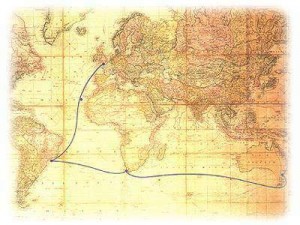Stay the course. Hold fast. Press on. Go the distance. Cowboy up. Persevere. Persist. Endure.
There’s no shortage of ways to offer encouragement—even a Facebook like or a hang-in-there cat might do. But cute phrases and cheesy posters fall flat in the face of genuine hardship. In times of adversity, we don’t need a hashtag—we need hope. But even with eyes fixed on Jesus, it’s hard to imagine the summit when all you see is the climb. That’s when stories can be powerful.
Stories of triumph give us hope and remind us that we are not alone. In our darkest hours, we look to those who’ve leaned in to God and through his strength succeeded beyond all odds; who’ve clung to their faith through the hardships, struggled and failed until they won the day. We are invigorated by the remembrance that some of the greatest successes in history—C.S. Lewis, Rosa Parks, even Paul—faced periods of failure, rejection, and hardship.
When the obstacles seem impassable, stories of victory give us the strength to press on.
One striking story of victory happened over 200 years ago, when the first English colonists set sail for Australia. One man in particular faced harsh, persistent obstacles—the Reverend Richard Johnson, whose hardships had only just begun.
An arduous journey
In May of 1787, Johnson and about 1,300 others left their home, bound for a recently discovered and far-flung new world. To say the journey was long is an understatement—the voyage lasted three times longer than the first Dutch expedition to Australia, and more than four times longer than Columbus’ journey to the new world. Nine months aboard a ship would strain the best morale, but these were no ordinary settlers. Over 700 of the passengers were prisoners—convicts who had traded a life at the end of the world over the end of a hangman’s noose.

Reverend Johnson was no ordinary clergyman; by royal appointment, he was chaplain to this prison colony. During the long voyage, he lead service every Sunday, and prayers each evening. The First Fleet endured storms, sickness, disease, death—even birth (many children were born during the voyage). Reverend Johnson dutifully served his congregation through it all.
Open horizons and empty hands
When the fleet reached Botany Bay in February of 1788, the wild continent stretched before them, impossibly vast—almost 60 times the size of England. The settlers had virtually nothing: the clothes on their backs, cookware and building supplies, and dwindling rations. Despite the immense difficulties facing them, Reverend Johnson raised his empty hands to God, and read from Psalm 116 at the first church service:
What shall I render unto the Lord for all his benefits towards me? I will take the cup of salvation, and call upon the name of the Lord.
This grateful submission would come to characterize Reverend Johnson’s ministry, despite the opposition, rejection, and even rancor he would endure for the next 12 years. But he pressed on, unrelenting, and went on to literally lay the foundation of the church in Australia.





